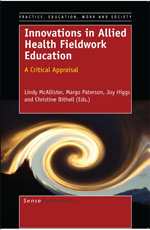 A new book about workplace learning in three allied health disciplines will be launched at the annual Charles Sturt University (CSU) conference for its academics, CSUEd2010, in Bathurst this week.
A new book about workplace learning in three allied health disciplines will be launched at the annual Charles Sturt University (CSU) conference for its academics, CSUEd2010, in Bathurst this week.Co-edited by academics from Australia, Canada, and the United Kingdom, Innovations in Allied Health Fieldwork Education - A Critical Appraisal presents a wide-ranging, international overview of theory, innovations, and evaluations of a range of approaches used in allied health fieldwork education.
One of the book’s co-editors, Professor Joy Higgs, AM, Director of CSU’s Education For Practice Institute (EFPI) and Strategic Research Professor at CSU’s Research Institute for Professional Practice, Learning and Education (RIPPLE), said, “Fieldwork, or workplace, education is critically important to the education of professionals and their preparation for the workplace because this is primarily where professional identity is shaped, and personal identity is challenged and extended.”
“It’s where students merge their theoretical knowledge with practical knowledge of how professionals get things done in practice.”
Professor Higgs explained that it is in various fieldwork education settings that the many core attributes required for successful professional practice develop more fully: capabilities such as teamwork, time management, prioritisation, conflict management, and high-level communication skills.
“Learning ‘in the field’ has long been an important part of the education of health professionals, and today it is highly valued,” Professor Higgs said. “It is also highly problematic for many reasons, including high workloads of workplace mentors, the high cost of healthcare with limited time for ‘distractions’ such as teaching students, and issues of accountability, litigation and quality assurance.
“The book was instigated by Associate Professor Lindy McAllister, formerly of CSU, now at UQ. Lindy argued that there were few mechanisms for sharing innovations in fieldwork education, and there was little published research or evaluation of it, especially in comparison to research in the clinical aspects of the allied health professions. Furthermore, the discussion around issues in fieldwork education was largely about quantity (getting more placements) rather than quality in those placements.”
“This book aims to provide answers to the question: How can fieldwork education for health professionals move into the next era of innovative, sustainable and sound educational programs and practices?”





Social
Explore the world of social